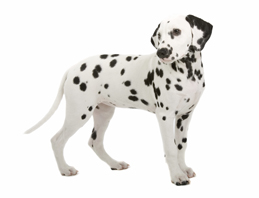Dalmatians: everything you need to know, right here

Dalmatians are not recommended for first-time dog owners. They are for people with an interest in training. Here is everything you need to know before buying a Dalmatian.
What to feed them
A normal, well-balanced diet suits Dalmatians, but to maintain their body condition they may need to eat more than other, more sedentary, breeds. Their energy and stamina should be taken into account, but don't overfeed them or they'll gain weight. An adult male should weigh about 55lb (25kg), a female less, and they should grow up to 22-24in (55-60cm) high.
How healthy are they?
Inherited deafness in one or both ears can affect 10 to 12 per cent of Dalmatian puppies; they are checked for signs of deafness from as young as five weeks old. Totally deaf dogs tend to be spayed or neutered, as they can be difficult to train and become anti-social or snappy. Dalmatians are also known for their longevity, generally living between 11 and 13 years, and sometimes up to 16.
What's their temperament like?
The only breed known for smiling - they will occasionally flash you the famous 'Dalmatian smile'. Their happy, playful nature makes them excellent family pets. Generally sensitive and loveable, they need gentle but consistent training to become the perfect companions. They make great watchdogs, too.
That distinctive coat:
Born with an all-white coat, puppies only develop their trademark spots at around two to three weeks. As an adult, this short-haired breed sheds profusely twice a year, so frequent brushing is needed to cope with the deluge. They should be bathed once a month at most; natural oils keep their coat shiny and prevent the skin drying out. Known as a fastidious breed, owners report a lack of 'doggy' odour and some Dalmatians have even been noted to avoid puddles!
Exercise, exercise, exercise
Dalmatians love long runs and plenty of play every day - if you're not an active person then they're not for you. Playful and excitable, they need lots of training to keep their rambunctious character in check. Unfairly believed to be unruly and hyperactive, it's only under-exercised Dalmatians that will channel their abundant energy into bad behaviour such as jumping up, house soiling and destructive tendencies.
Scott Miller, vet

